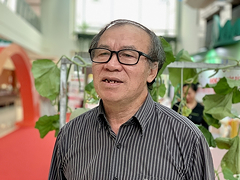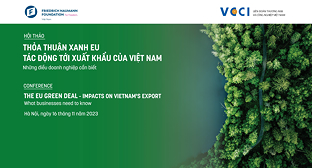Developing organic agriculture will help Vietnam become the leading supplier
07/12/2022 08:37

Talking to Customs News, agricultural expert Nguyen Dang Nghia, Director of the Center for Tropical Agriculture Research and Consulting, said that the early completion of policies on organic agriculture will help Vietnam seize the opportunity to become a supplier and exporter of food for the world market.
Decree 109/2018/ND-CP on organic agriculture has been in effect for 3 years. How do you evaluate the changes in organic agricultural production in Vietnam since the issuance of this Decree?
Vietnam's agricultural industry has experienced more than 40 years of innovative development. In addition to the achievements of the industry that bring prestige to Vietnamese agricultural products in the world market, Vietnamese agriculture also leaves many potential risks and significant consequences to the soil, water and ecosystem.
Therefore, the promulgation and implementation of Decree 109/2018/ND-CP on organic agriculture is urgent with the desire that Vietnamese agriculture will develop sustainably and quickly become one of the superpowers in agricultural exports.
After 3 years of implementation, the Decree has brought many positive changes. If in 2016, our organic fertilizer amount accounted for only about 5% with 0.8 million tons, but now it has increased to 20% by 2022, equivalent to about 3 million tons and is constantly increasing.
Besides, currently, the rate of using biological pesticides has also increased to about 21%. These are very rapid steps to create a foundation for organic agricultural production, especially rice production.
Along with promoting the use of pesticides, biological products and organic fertilizers, recently, the Ministry of Agriculture and Rural Development has also directed the Plant Protection Department to implement socialization, expanding the breeding of natural enemies such as parasitic wasps, pintail beetles and beneficial organisms to destroy pests on important crops, especially in rice production.
Some southern provinces have been implementing models of organic agricultural production on rice, cashew, pineapple, mango, longan and breast milk to provide importers of organic products for service in the European, North American and Japanese markets. In addition, there are organic aquaculture projects in Ca Mau, An Giang and organic farming models are gradually forming and bringing positive results, initially changing farmers' practices. Accordingly, in addition to domestic consumption, Vietnamese organic products have been exported to markets such as Japan, UK, Korea, Singapore and Russia.
The export turnover of organic products is still quite limited, what do you think about this?
Despite many positive steps, in general, the area of organic agricultural production in Vietnam is still very limited and the production scale is still small. Currently, we do not have a plan for organic production, there are no separate mechanisms and policies to support organic production, which integrates implementation in other programs and projects such as applied hi-tech agriculture development programs, supporting agricultural production and consumption linkages. In Vietnam, there are not many organizations inspecting and certifying organic production, most of the organic certification must use foreign organizations, so the cost is high and difficult to implement, especially for small businesses.
Therefore, organic agricultural production is facing challenges in terms of producer income, production process complexity and monitoring. At present, the majority of farmers do not want to convert to organic agriculture due to unproven income attractiveness and an uncommitted consumption market. Moreover, the production process is still strict, it takes a long time to improve the soil, and create a source of irrigation water to meet the quality requirements, so the production cost is high.
Another problem is that currently there is no set of specific regulations and standards for each type of product. The national standard TCVN 1104:2015 guiding the production, processing, labeling and marketing of foods produced by organic methods, issued by the Ministry of Science and Technology in 2015, has not really come to life yet, then it had to prepare to be replaced by the National Standard TCVN 11041:2017 which is being drafted with more detailed regulations.
What are the solutions needed to solve these bottlenecks, sir?
Currently, the world has compared Vietnam to "the kitchen of the world". That shows the great potential of Vietnamese organic agricultural products in the world market and it can become a reality if the above-mentioned bottlenecks are removed.
Organic agricultural production is no longer a technical issue but a policy issue. The Government and ministries and branches related to organic agriculture should soon issue specific and feasible policies to support the development of organic agriculture. Specifically, it is necessary to plan and protect areas of land and water sources that are still suitable for commodity-oriented organic agricultural production. At the same time, there should be supportive and preferential policies for organizations and individuals involved in the production, processing and consumption of organic agricultural products; the policies must be transparent and harmonize the interests of enterprises, organizations and individuals participating in the chain.
The system of standards and regulations on production, processing, quality certification, inspection and supervision related to organic agriculture also needs to be perfected to serve as a basis for enterprises, cooperatives and farmers to develop and apply this system favorably.
In particular, by-products of agricultural production such as rice husks, coffee husks, coconut by-products, bagasse, cassava residue also need to be exploited and processed into organic fertilizers to return to the soil. If we do this, we will achieve many goals such as developing the circular agriculture, increasing the value of agricultural products as well as meeting the environmental and social criteria that import markets are targeting.
Source: Customs News
Các tin khác
- Find opportunities in niche markets to increase exports (15/04/2024)
- US extends conclusion on tax evasion probe into Vietnamese wooden cabinets (15/04/2024)
- Italy remains Vietnam's largest iron and steel import market (15/04/2024)
- Does the EU have what it takes to fight China on green tech? (15/04/2024)
- Not enough evidence to investigate Chinese HRC: businesses (15/04/2024)
 Home
Home
 About Us
About Us




















